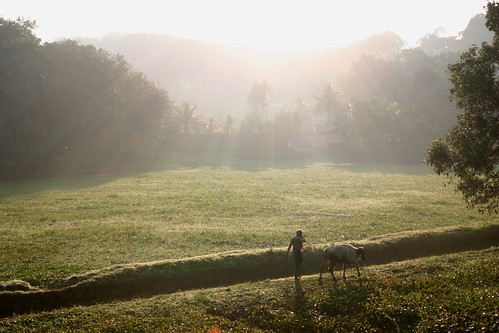
For some reason, I find myself thinking about my home back in Kerala. I was there last Christmas. I got to spend some quality time there after a very long while. Kerala, especially my hometown of Kottayam is changing like there is no tomorrow. Once a sleepy little town, it is now choking under traffic and high rise construction. It can be a little shocking and difficult to come to terms with it. People look at you as if you lived in a bubble all this time. After a while, you are forced to reconcile. Change is inevitable, I guess. With a burgeoning population and an economy that is heavily dependent on expatriate remittances, a transformation of the landscape away from agriculture into a retirement community looks inevitable.
Kerala once upon a time was green with lush paddy fields. Agriculture was profitable and the economy's mainstay. Ample rainfall, the local climate and cheap labor made paddy fields viable. The photograph above is close to where my forefathers owned and tilled the land. Families were big in those days. With each successive generation, land was split among siblings. Smaller the fields got, greater the collaboration required to cultivate. Along the way, Kerala started experiencing political, ideological and educational shifts. As the labor force became more educated, they shifted to higher skilled and better paying jobs. Mechanized farming never filled the labor void. One could argue that retail politics prevented mechanization.
As agriculture waned, politicians enacted short sighted land use laws.A paddy field could not be used for anything else. Unless (of course there are loopholes) a field is not tilled continuously for a long period. I believe the magic number is 10 years. Many fields lay unused.
Climate Change has now almost made certain that paddy cultivation is nonviable. I was talking to an aunt of mine about her land. Rainfall is unpredictable and with every passing year it is decreasing. Last year it was about 25 percent less and ground water is depleting.
The global real estate boom has not escaped Kerala. As Tom Friedman would say, in a flat world, trends are global. Remittances from Malayalees nation wide and world wide find its way into real estate investments. With land expensive and difficult to find, unused paddy fields became the obvious targets and high rises the obvious solution. What is not obvious is water consumption and sewage disposal. Most places in Kerala do not have municipal water supply and sewage disposal. Large bore wells are sucking the water tables dry and septic tanks are playing havoc with ground water.
I still the remember the day I took this picture. It was early morning and as I walked past these fields, I wondered about saving the last remaining paddy fields in Kerala. I doubt if profitable agriculture is possible under the current laws in Kerala. One idea that has been bouncing around in my head is the idea of converting all these unused paddy fields into wet lands.
Why wet lands?
For one it will definitely help the depleting water table. It might also stop real estate developers from poaching the remaining fields. I think the key here is to have a successful public private partnership. The owners of these unused land will need an incentive not to sell them. That would mean continued income and a good understanding of environmental benefits. There are several government programs promoting watershed developments in India. What if those funds could be channeled here. The land owners could be given a monthly income for maintaining the wetlands.
Paddy fields which have already been converted to flats (condos) and villas continue to be marketed as homes with a view (a view of not yet poached paddy fields). So developers could also be a partner in the conservation efforts. Their properties will continue to have a great view.
These wetlands could be a blessing to both local and migratory birds. The fast disappearing frog population, I am sure, will be very appreciative. Lastly, the more green spaces there are, the more tourists there will be. That last part if not managed properly could actually be a bad thing!
A lot of wishful thinking for one post ! Anyways...here are some photographs from my travels there.


2 comments:
i share similar concerns and feel the pain of losing our beautiful-nature-filled country sides to the rising constructions.
Awesome pictures.It's been a while since I visited you blog and now you have 3 posts and 3 vacations to share :-)
Post a Comment